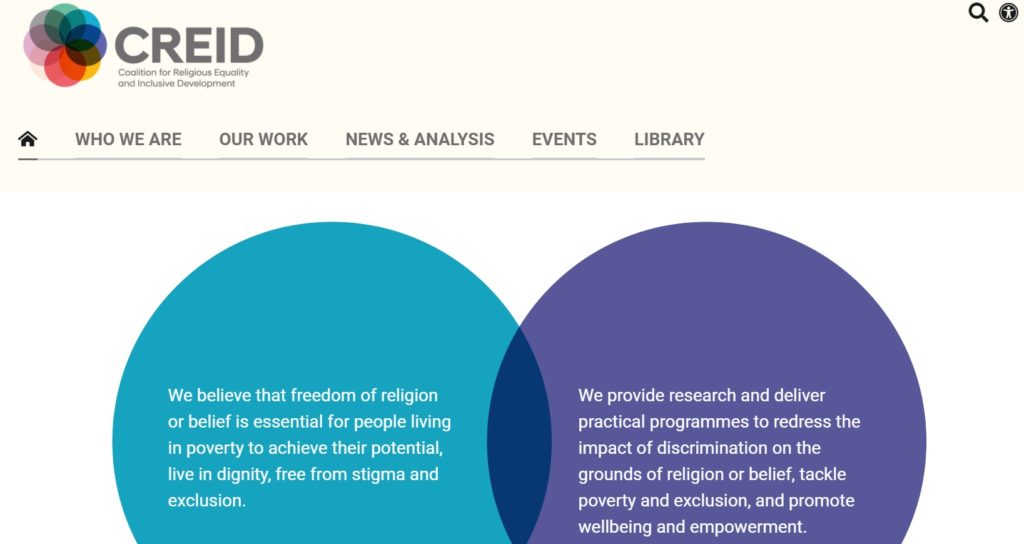The Coalition for Religious Equality and Inclusive Development (CREID) aims to redress the impact of discrimination on the grounds of religion or belief, tackle poverty and exclusion, and promote people’s wellbeing and empowerment using research evidence and delivering practical programmes.

Discrimination on the grounds of religion or belief can mean that people:
- lack access to basic services such as health or education
- experience verbal, emotional or physical violence and abuse
- be excluded from vital social and political processes.
CREID believes that freedom of religion or belief is essential for people living in poverty to achieve their potential, live in dignity, free from stigma and exclusion.
We provide research and deliver practical programmes tackling the impact of discrimination on the grounds of religion or belief.
Selected publications
- Using Participatory Methods to Explore Freedom of Religion and Belief: Whose Reality Counts? (open access book)
- Violence and Discrimination Against Women of Religious Minority Backgrounds in Iraq (Intersections Report) edited by Mariz Tadros, Sofya Shahab and Amy Quinn-Graham
- ‘What About Us?’: Global Perspectives on Redressing Religious Inequalities (open access book) edited by Mariz Tadros
- Understanding Inclusivity of Religious Diversity in Humanitarian Response (Working Paper) by Olivia Wilkinson and Jennifer P. Eggert
- Freedom of Religious Belief and People with Disabilities: Evidence from India (Policy Briefing) by Brigitte Rohwerder, Clement Arockiasami and Stephen Thompson
Please visit the Library on the CREID website to view all our publications and resources.
UK aid funded programme
From 2018 to 2022, CREID was supported by UK aid from the FCDO and focused on five workstreams:
- Mainstreaming awareness of Freedom of Religion or Belief (FoRB) in development to ensure that policies and programmes are sensitive and responsive to inequalities on the grounds of religion or belief
- Investing in interfaith service delivery in communities where there are poverty and religious tensions
- Monitoring hate speech and looking at how digital technology and media are affecting social harmony
- Building coalitions at national level and supporting local campaigns promoting FoRB
- Engendering cross fertilisation for religious inclusivity by bringing about collaboration between humanitarian organisations, faith leaders, rights activists and development practitioners.
This phase of the CREID programme was led by the Institute of Development Studies in partnership with Al-Khoei Foundation, Minority Rights Group and Refcemi (the Coptic Office for Advocacy and Public Policy).
IDS staff involved with supporting CREID during this phase include Pamela Hajal, Helen Littler-Handlos, Susanne Schirmer, Sofya Shahab and Emilie Wilson. Former staff include Kathryn Cheeseman and Andrea Mari.
Religious inequalities and the impact of Covid-19
CREID Podcast (2022)
The CREID podcast gave voice to those working in some of the toughest areas in development and explored how religion can impact on the life chances of some of the most vulnerable people in the world.
Religious Inequalities in Development event series
The Religious Inequalities in Development event series challenges us to understand why inequalities underpinned by individual belief and/or religious affiliation to a community have been a blind spot for international development for so long. What can be done to better understand and integrate an approach to Freedom of Religion or Belief (FoRB) into global development? Watch videos of past seminars.
